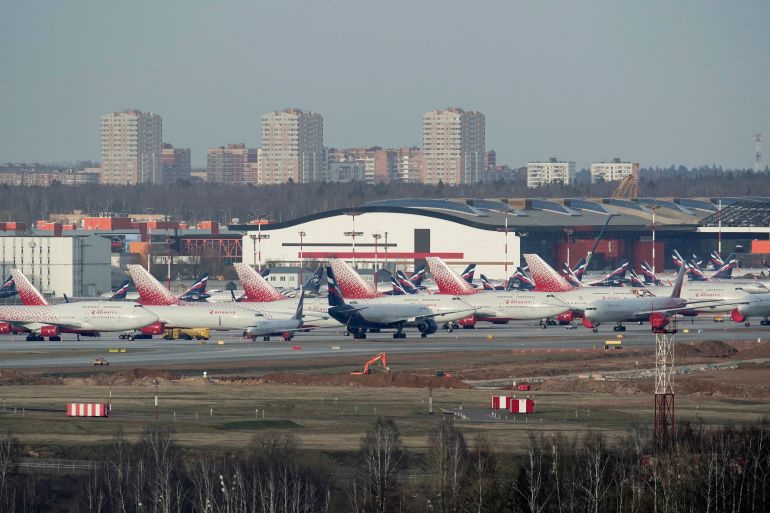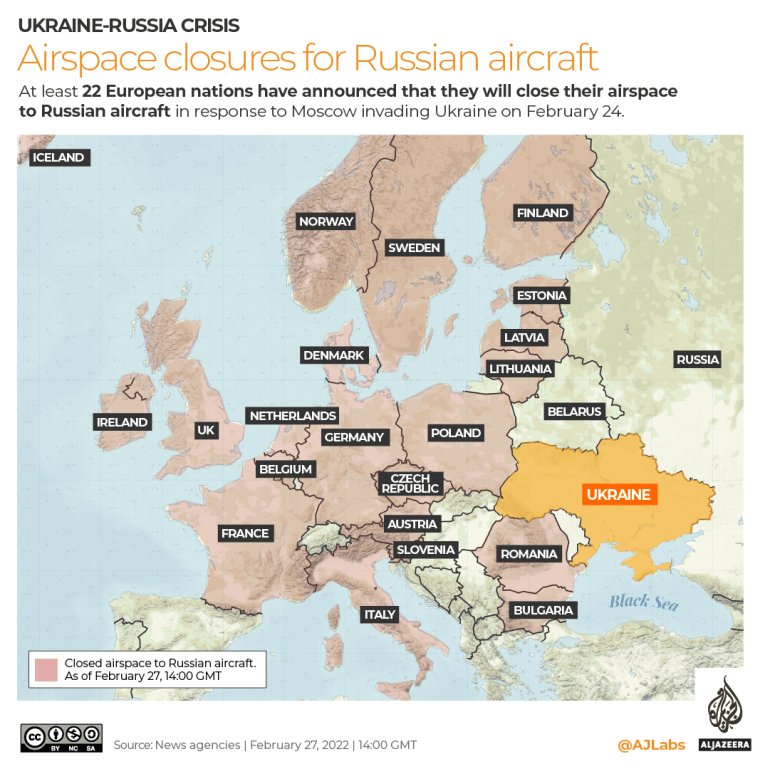EU ups the ante with Russia; closes airspace, bans media
European Union announces new sanctions targeting Russian airlines, state-affiliated media.

The European Union has announced sweeping new sanctions against Russia over its invasion of Ukraine, closing its airspace to Russian aircraft and banning Russian state media outlets broadcasting in the bloc.
EU chief Ursula von der Leyen, announcing the measures on Sunday, said the Union was also taking the unprecedented step of financing arms to Ukraine and was hitting Russian ally Belarus with sanctions for facilitating the invasion.
Keep reading
list of 4 itemsUkraine, Russia diplomats to meet amid Russian assault
Ukraine lodges case against Russia at UN’s top court
‘Double standards’: Western coverage of Ukraine war criticised
“They won’t be able to land in, take off or overfly the territory of the EU. Including the private jets of oligarchs,” von der Leyen said of the airspace measures in a tweet.
Individual EU countries have been announcing bans on Russian planes in their airspace in recent days. The UK has additionally banned Russian airlines from landing at its airports or crossing its airspace, meaning Moscow is facing a near-total blockade of the continent’s skies.
Canada also said on Sunday that it had shut its airspace to Russian aircraft, effective immediately.
A spokesperson for Canada’s transport minister said there are no direct flights between Russia and Canada, but several Russian flights a day pass through Canadian airspace.
The United States is considering similar action, but has yet to make a final decision, according to US officials.
The latest European measures come on top of sanctions von der Leyen announced a day earlier that are about to be implemented: cutting some Russian banks from the SWIFT interbank messaging network, banning all transactions with Russia’s central bank, and adding restrictions on Russian oligarchs.
The EU has also sanctioned Russian President Vladimir Putin and his foreign minister Sergey Lavrov.
Together, the steps added up to the toughest stance the EU has taken against a country, reflecting the bloc’s horror and anger at Putin’s assault on Ukraine, launched on Thursday.
“As the war in Ukraine rages on, and Ukrainians fight bravely for their country, the European Union steps up once more its support for Ukraine and the sanctions against the aggressor – Putin’s Russia,” von der Leyen said in a broadcast address.
She said the airspace ban would prohibit flights into or over the EU by “every Russian plane – and that includes the private jets of oligarchs”.
The measure consolidated what was already de facto largely in place, with many of the EU’s 27 nations individually announcing airspace closures to Russian flights.

Moscow has retaliated with reciprocal measures, and John Strickland, an aviation consultant, said the moves will affect services between Europe and Asia.
“Now, a large number of these flights operate typically to China and Japan, for example,” he told Al Jazeera.
“Ordinarily, that would be a significant commercial hit for those Western European airlines, but it’s significantly less so at the moment – very simply because, since the coronavirus pandemic, which is, of course, ongoing, large parts of Asia remain closed, not least China.
“China is completely closed due to commercial air traffic for passengers. So, that volume of passenger traffic is simply not there and therefore there isn’t as much of a hit on airline revenues.”
Stopping Russian ‘lies’
The European move against Russian state media targeted its outlets Russia Today – known as RT – and Sputnik, and their subsidiaries.
Von der Leyen said they “will no longer be able to spread their lies to justify Putin’s war and to sow division in our Union”.
The EU’s foreign policy chief Josep Borrell, at her side, said the measure involved “banning Russia Today and Sputnik from broadcasting in the European Union”.
Sputnik responded with a sardonic statement, saying: “We suggest the European Commission not stop halfway and ban the internet altogether.”
RT’s French subsidiary tweeted the ban “goes against the very principles of freedom of expression” and said it was a victim of “censorship”.
Von der Leyen said the sanctions against Belarus were aimed at “the other aggressor in this war”, naming the government of strongman Alexander Lukashenko.
“We will hit Lukashenko’s regime with a new package of sanctions,” she said.
“We will introduce restrictive measures against their most important sectors. This will stop their exports of products from mineral fuels to tobacco, wood and timber, cement, iron and steel.
“We will also extend to Belarus the export restrictions we introduced on dual-use goods for Russia.”
Belarusians helping Russia’s military operation would also be sanctioned, she said.
Von der Leyen said the decision to provide funding for the purchase and delivery of arms to Ukraine was “a watershed moment for our Union”.
Borrell said he would “propose to use the European Peace Facility for emergency assistance measures to finance the supply of lethal material to the Ukrainian army, as well as badly needed fuel, protective equipment and medical supplies”.
“We are doing this because this war requires our engagement in order to support the Ukrainian army – because we live in unprecedented times,” he said.